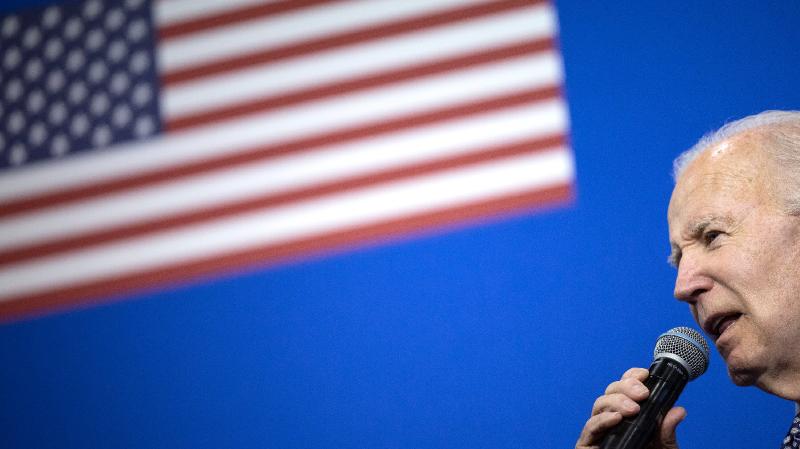Why America Is Getting Tough on Trade
By: Paul Krugman (New York Times)
Klueless Krugman is at it again. Krugman is desperately trying to hammer his fiction of neoliberal progressivism into a shape that fits the real world.
Dear Dr. Krugman, didn't you get the memo? MAGA is why America is getting tough on trade. Trump was a far more consequential policymaker than people like Krugman can wrap their heads around. Trump renegotiated trade agreements with a priority on American interests; something that is anathema to neoliberal progressives. Trump really did rewrite the rules. Biden, being the charlatan he is, only follows the path of least resistance by following what Trump put in place.
Neoliberal progressives, like Krugman, have always treated the United States like a red-haired step child to be exploited and abused. Neoliberal progressives firmly believe that Congress possesses a magic money tree and that money can solve every problem. But we've seen with our own eyes that the United States cannot handle emergencies without factories. The military is helpless without factories. Gunboat diplomacy won't work without factories. Peacetime factories are a necessary reserve for times of emergencies and wartime necessities.
Klueless Krugman completely ignores that GATT was established by an industrial United States and then Krugman deploys glib neoliberal platitudes to reinforce that ignorance. The greatness of America came from its industrial base. Reviving that industrial base will make America great again.

Remember when Donald Trump's trade wars were front-page news? At this point, concerns over Trump's tariff policy seem almost quaint: Who cares if an insurrectionist is also a protectionist?
But some of the tariffs Trump imposed are still in place, and on Friday the World Trade Organization, which is supposed to enforce rules for global commerce, declared that the official rationale for these tariffs — that they were needed to protect U.S. national security — was illegitimate.
And the Biden administration, in turn, told the W.T.O. — in startlingly blunt language — to take a hike.
This is a very big deal, much bigger than Trump's tariff tantrums. The Biden administration has turned remarkably tough on trade, in ways that make sense given the state of the world but also make me very nervous. Trump may have huffed and puffed, but Biden is quietly shifting the basic foundations of the world economic order.
Since 1948 trade among market economies has been governed by the General Agreement on Tariffs and Trade, which sets certain ground rules for, um, tariffs and trade. In 1994 the GATT was folded into the rules of the World Trade Organization.
The GATT/W.T.O. system doesn't mandate any particular level of tariffs. It does, however, forbid countries from imposing new tariffs or other restrictions on international trade — in effect, it locks in the results of past trade agreements — except under certain specified conditions. One of these conditions, laid out in Article XXI, says that a nation may take action "which it considers necessary for the protection of its essential security interests."
If that sounds open-ended, that's because it is. And Trump clearly abused the privilege, claiming that we needed tariffs on steel and aluminum to protect us from the menacing threat of … imports from Canada.
As it happens, the tariffs on Canadian metals are gone, as are most of the similar tariffs on Europe (although the agreement there stops short of full free trade). But the tariffs on China are still in place. More important, the Biden administration has declared that the W.T.O. has no jurisdiction in the matter: It's up to America to determine whether its trade actions are necessary for national security, and an international organization has no right to second-guess that judgment.
Wait, what? According to the right, Biden and company are globalists, soft on China and unwilling to stand up for America. Why have they gotten so tough?
Part of the answer is that U.S. policymakers are more aware than ever before of the threats autocratic regimes can pose to the world's democracies. Russia's invasion of Ukraine has shown that dictators sometimes resort to military force even when it doesn't make rational sense, and Vladimir Putin's attempt to punish Europe by cutting off the flow of natural gas highlights the risk of economic blackmail.
China isn't Russia, but it's also an autocracy (and seems to be becoming more, not less, autocratic over time). And the Biden administration is trying to limit China's ability to do harm, with a special focus on semiconductors, which play such a central role in the modern world.
On one side, America is now subsidizing domestic production of semiconductors, aiming to reduce reliance on China among other suppliers. Even more drastically, the U.S. has imposed new rules intended to limit China's access to advanced semiconductor technology — that is, we're deliberately seeking to hobble Chinese technological capacity. That's pretty draconian; you can see why I'm a bit nervous.
The thing is, it's easy to imagine China appealing to the W.T.O., arguing that these actions violate international trade rules. But the United States has signaled in advance that it doesn't care — that it considers these policies to be outside the W.T.O.'s jurisdiction.
But wait, there's more. The Biden administration's biggest policy achievement so far is the enactment of the Inflation Reduction Act, which despite its name is largely about fighting climate change. It does so mainly by subsidizing clean energy, which is fine. But the subsidies have a strong nationalistic aspect — for example, tax credits for electric cars are restricted to vehicles assembled in North America.
Almost surely, this economic nationalism — which allows climate activists to point to all the jobs created by green energy subsidies — was essential to getting the bill passed. But does it violate trade rules? I'm not sure how the Biden administration will defend the policy if challenged, but it might say that protecting the environment is a national security issue.
That may also be the defense offered for a proposed U.S.-Europe agreement to impose "climate-based tariffs" on Chinese steel.
But if the United States, which essentially created the postwar trading system, is willing to bend the rules to pursue its strategic goals, doesn't this run the risk of protectionism growing worldwide? Yes, it does.
Nonetheless, I think the Biden administration is doing the right thing. The GATT is important, but not more important than protecting democracy and saving the planet.





Neoliberal progressives, like Krugman, only care about free money; they don't really give a damn about free trade. The neoliberal smoke & mirror platitudes about free trade are only a means to an exploitive end.
Free Trade is a farce. Supply Side Economics has compromised everything. The wealth is concentrated. As far as Trump, he doesn't understand anything about economics, economies or long term effects of economic actions. Besides, Trump was and continues to be in Putin's pocket. He is nowhere man without a clue about anything except the next grift.
Somehow I don't think all the tariffs and bans are going to do much to reduce the inflation.